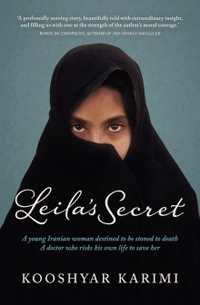Read this story with an open, unjudgemental heart…

Under Sharia Law, the punishment for an unmarried woman, who is raped and becomes pregnant, is death.
Leila is 22 years old and lives in a small town in Iran with her parents, elder sister and three cruel brothers. The country is under Sharia Law and although Leila, intelligent and passionate, yearns to go to university her family will not allow it. Leila is pregnant and unmarried.
The author, Kooshyar Karimi, was born in a slum to a Muslim father and a Jewish mother, and is now married with one daughter. He has a successful medical practice and a kind heart, often treating his poorest patients for free. He is also of a liberal mindset and cannot abide the treatment of women in Sharia society.
Because of his strong opposition to the treatment of women, Dr Karimi illegally performs terminations and hymen repairs for women such as Leila, saving them from death by stoning, or at their own hands. His actions risk the lives of himself and his family. Although her pregnancy was well advanced when Leila came to Dr Karimi, he managed to save her life and in so doing, learn her story.
These are the two voices of Leila’s Story. Kooshyar intertwines Leila’s story with his own because, as he says, “I can no longer think of her life and my life as separate. I too was an unwanted child”.
I am humbled by the reading of this book. I am thankful that neither myself nor my children are Leila and I pray that my grandchildren are never put into these sorts of situations. I do not put myself in Leila’s shoes because the way of life in Iran cannot be compared to my way of life, for which I am grateful.
Nonetheless the issue of abortion does affect lives all over the world. I was pregnant before I married my children’s father. It was put to me that abortion was an alternative, not to me it wasn’t. I was young and silly but determined to have my child. I am neither pro-life nor pro-abortion. Despite what religious factions in all religions will argue, in the end, it is a personal decision. Whether you agree with that decision or not, it is not yours to make. You can, and maybe should, lay out the pros and cons if asked. In the end, the one thing you must give is support as this is a terribly difficult decision requiring support and understanding.
I do not condone the retribution laid down as described in this book! But I have to ask, have non-Sharia religions forgotten how women in the 40s, 50s and 60s were treated when they, for whatever reason, found themselves in Leila’s position?
Women have been coerced, raped and lied to forever, ending up like Leila. It isn’t a recent trend. Sharia may take punishment to the extreme, and I cannot pretend to understand because it goes against everything I believe in, but let us not fool ourselves into taking too high of a moral stand. Granted non-sharia religions do not stone women to death but does that justify our treatment of women? Leila was young, idealistic and naïve but any young woman can be the same.
Dr Karimi has what we all need; a generous non-judgemental heart that drove him to risk not only his life but that of his family to save lives. Please let’s not forget that and let us not judge. Dr Karimi, I believe that the goodness in your heart will always shine like the sun.
Whether you are for a woman’s rights to choose abortion or against it, whether you are pro or anti asylum seekers, whether you are religious or not, please read this story with as open non-judging heart as the author who wrote it.
I would like to thank Dr Karimi for telling this story and Penguin Books Australia for allowing me to read and review this ARC.
Available for $14.95 (eBook) via Booktopia
What do you think about forced abortion and the other topics presented in this review? Are you interested to read this book?








 Proudly Australian owned and operated
Proudly Australian owned and operated